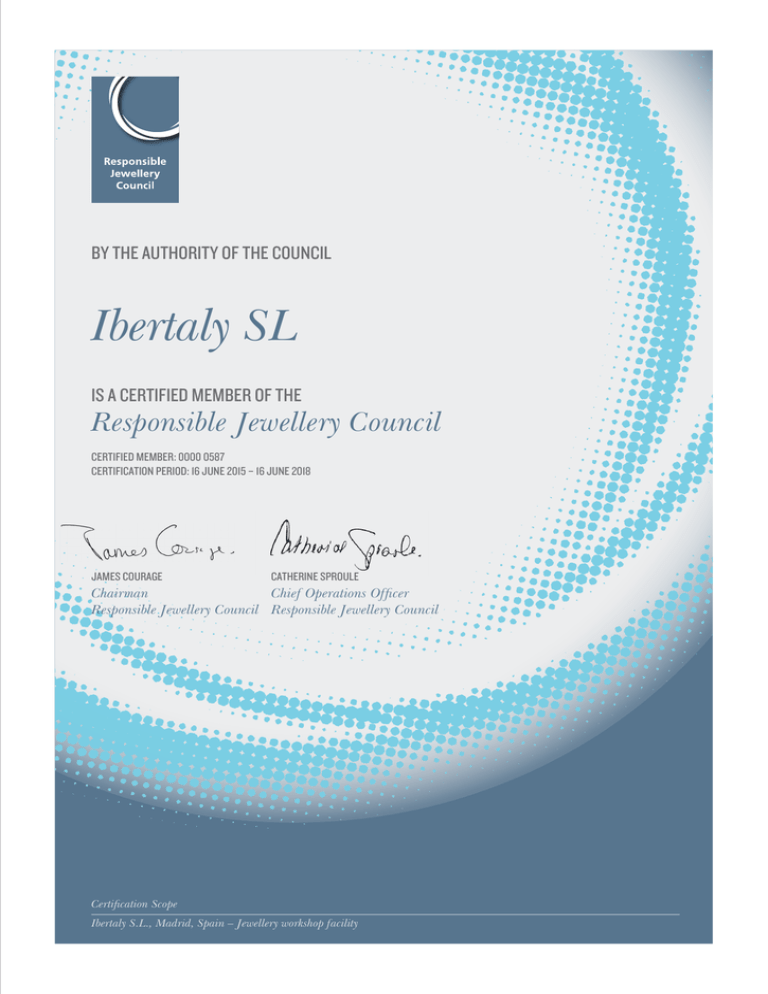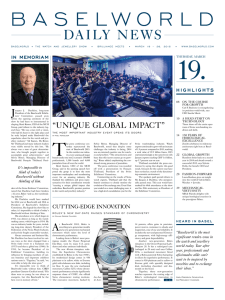Ibertaly SL
Anuncio

BY THE AUTHORITY OF THE COUNCIL Ibertaly SL IS A CERTIFIED MEMBER OF THE Responsible Jewellery Council CERTIFIED MEMBER: 0000 0587 CERTIFICATION PERIOD: 16 JUNE 2015 – 16 JUNE 2018 JAMES COURAGE CATHERINE SPROULE Chairman Chief Operations Officer Responsible Jewellery Council Responsible Jewellery Council Certification Scope Ibertaly S.L., Madrid, Spain – Jewellery workshop facility RJC CERTIFICATION INFORMATION – CODE OF PRACTICES Summary Certified Member Ibertaly SL Membership Forum Jewellery Manufacturer and/or Wholesaler Certification Number for this Certification 0000 0587 Certification Period 16 June 2015 – 16 June 2018 Audit Date 25-26 March 2015 Audit Type Re-Certification Previous Certifications 1 Applicable Standard Code of Practices 2013 Accredited Auditor SGS United Kingdom Limited Certification Scope Ibertaly S.L., Madrid, Spain – Jewellery workshop facility Lead Auditor: Pilar Orden Applicable Provisions 1. General Requirements: 1-4, except 3.2 2. Responsible Supply Chains and Human Rights: 5-12, except 7, 11.3 and 12 3. Labour Rights and Working Conditions: 13-20 4. Health, Safety and Environment: 21-25 5. Diamonds, Gold and Platinum Group Metals Products: 26-28, except 27.4 and 28 6. Responsible Mining Sector: Not applicable Provenance Claims Not applicable Auditor Statement of Conformance Based on the scope and findings of the Audit, the sites visited and the available information provided by the Member: he Member has demonstrated a conformance level consistent T with a 3 year Certification Period. he Member has demonstrated a conformance level consistent T with the transitional 1 year Certification Period for 1 year. he Member is not eligible for RJC Certification due to having four T consecutive 1 year Certification outcomes. ritical breaches have been identified and the RJC Management C Team should initiate disciplinary procedures. Mid-Term Review Based on the scope and findings of the Certification Audit/Re-Certification Audit, the sites visited and the available information provided by the Member: A. The Member will not require a Mid-Term Review because: o anticipated changes to the Certification Scope during the N Certification Period. Member has < 25 full time equivalent personnel. ow risks of changes to current conformance levels and strong L management controls. . The Member will require a desktop Mid-Term Review B during the 3 year Certification Period to review progress on corrective action against non-conformances within 12-24 months, but a site visit is not required because: The actions can be verified remotely; or No risk to Critical Provisions; or here are parallel audit programs for equivalent recognised T schemes (e.g. De Beers BPP, SA8000, OHSAS 18001, ISO14001) . The Member will require a Mid-Term Review during the C 3 year Certification Period that will include the need for site visits because: nown and anticipated changes to Certification Scope during the K Certification Period ertification Audit identified >2 Minor NCs for Critical Provisions; C or > 4 Minor NCs in total ew systems and controls for Critical Provisions that could not be N tested at the Certification Audit Facilities with risk of non-conformances against Critical Provisions ther compelling reason presented by the Lead Auditor. O (Please state the reason): Confirmation The Auditors confirm that: he information provided by the Member is true and accurate to T the best knowledge of the Auditor(s) preparing this report. Auditor Signature he findings are based on verified Objective Evidence relevant to T the time period for the assessment, traceable and unambiguous. he scope of the assessment and the method used are sufficient T to establish confidence that the findings are indicative of the performance of the Member’s defined Certification Scope. he Auditor(s) have acted in a manner deemed ethical, truthful, T accurate professional, independent and objective. On file Code of Practices Certification Scope RJC Members must achieve Certification against the Code of Practices within two years of joining the RJC. The Certification Scope must include those Entities, Facilities and Business Activities under the Member’s Control that activity contribute to the Diamond, Gold and/or Platinum Group Metals Jewellery supply chain. This includes the following sectors, where applicable: • Exploration and Mining • Diamond Trading, Cutting and Polishing • Precious Metals Refining, Trading and Hedging • Jewellery Manufacturing and Wholesaling • Jewellery Retailing • Service Industries, including grading, assaying, appraising, secure transport providers and others. Steps in the Certification Process 1 2 3 4 5 SELF ASSESSMENT CERTIFICATION AUDIT REPORTING CERTIFICATION DECISION PERIODIC REVIEWS • Conducted by the Member in accordance with the Certification Scope • Preparation for Certification Audit by independent third party RJC Accredited Auditors. • Conducted by • Auditor prepares independent third Audit Report party RJC Accredited including Statement Auditors of Conformance for • Selects a the RJC representative sample • Member implements to review from corrective action • Certification Scope plan/s, where Evidence based required. assessment of conformance • RJC reviews Audit • Mid-term review, may Report for clarity and be required. completeness , follow • Re-certification audit up where required. is required at end ov • RJC grants certification period. Certification based on • Conducted to Auditors' Report confirm continuing • Certification details conformance and to posted on website address changes. • Member can use RJC Certification Logo Audit methodology The RJC Code of Practices documentation is comprehensive and includes an auditable standard, detailed Standards Guidance and Assessment Manual, handbook for certification and assessment tools for businesses and auditors. These are all publicly available and can be downloaded at: http://www.responsiblejewellery.com/rjc-certification/code-of-practices-certification13/ Independent third-party audits are conducted by RJC Accredited Auditors to verify that a Member’s business performance and its systems and processes conform to the requirements specified in the RJC Standard. The audit process is a management systems audit aligned with ISO19011. Auditors use the triangulation method of management and employee interviews, documentation review and facility observations to verify an Entity’s performance against the applicable standards. Auditor Accreditation Third party auditors carrying out RJC Certification audits must be accredited by the RJC, a process which involves assessment of competence, independence and internal quality systems of the auditing firm. RJC also provides mandatory training on its standards for accredited auditors. Auditor accreditation information can be found at: http://www.responsiblejewellery.com/auditors/ RJC Complaints Mechanism The RJC aims to ensure the fair, timely and objective resolution of complaints relating to potential non-conformance with RJC Certification or RJC’s own policies and procedures. Where complaints arise, it is a condition of participation in RJC activities for RJC Members and Accredited Auditors to submit to the RJC Complaints Mechanism and to be bound by the decisions of the RJC. However this does replace or limit access to judicial remedies. Full documentation supporting the RJC Complaints Mechanism can be downloaded from: http://www.responsiblejewellery.com/contact-us/rjc-complaints-mechanism/ Disclaimer No guarantee, warranty or representation is made as to the accuracy or completeness of this information. Compliance with RJC’s standards and procedures is neither intended to, nor does it create, establish, or recognise any legally enforceable obligations or rights of, or against, the RJC and/or its Members or signatories.
